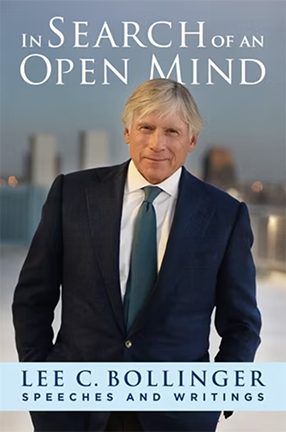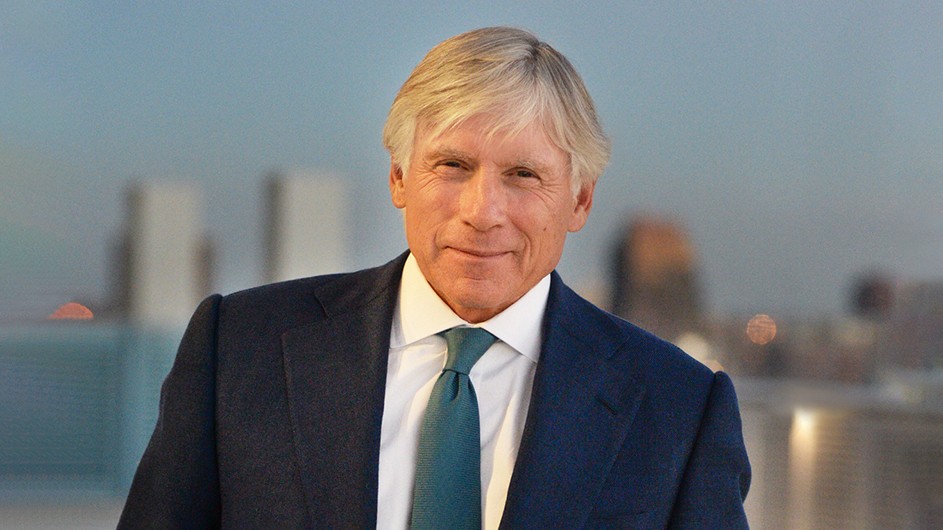Lee C. Bollinger on the First Amendment, Free Speech, Affirmative Action, and More
In his new book, “In Search of an Open Mind,” Columbia’s president emeritus offers a collection of his speeches, articles, and opinion columns.
Throughout his 21-year tenure as president of Columbia, Lee C. Bollinger was an outspoken national leader on many of the major issues confronting higher education and society more broadly. One of the country’s preeminent First Amendment scholars, he published frequently on free speech and press while leading a wide range of transformational University initiatives. During a period marked by profound change, he spoke within and beyond the academy about the challenges facing journalism, global free speech, and academic freedom, as well as the critical value of increasing racial and cultural diversity in higher education through affirmative action.
In Search of an Open Mind is a curated selection of Bollinger’s speeches, articles, and opinion columns during his time as president of Columbia, reflecting on many significant events and challenges. These pieces cover an array of topics, from civil rights and civil liberties to the nature of the university and living a good life. Bollinger spoke often about the essential role of affirmative action in college admissions in overcoming the long legacy of racial discrimination, having led the litigation in the landmark case of Grutter v. Bollinger, in which, for the first time, a majority of the U.S. Supreme Court upheld the practice as constitutional.
Bollinger spoke about the book with Columbia News, along with what he’s teaching this semester and what he’s reading and thinking about these days.
How did this book come about?
It came about by my being president of Columbia! I was obligated to provide commencement and convocation speeches, and I was also a defendant in an important litigation I led about affirmative action when I was president at the University of Michigan. So I had to think and write about issues like free speech, free press, and tolerance for a wide diversity of views—issues that I have thought about for 50 years. I care enormously about the convocation addresses and commencement speeches, and I worked incredibly hard on each one, so they were not casual productions. It’s an incredible opportunity to be able to speak to students and families at those particular moments, and I treated the addresses accordingly.
Then there were issues and events that came up that I wrote about—the Mahmoud Ahmadinejad visit to Columbia in 2007, issues around Israeli-Palestinian conflicts, which, of course, as we know, are ongoing. Other selections are essays that I did on various topics, especially diversity in higher education and the mission of universities themselves, which, together, are all of a piece.

How did you select which speeches, articles, and opinion columns to include in the book?
Some entries were a given. The Tanner Lectures at Cambridge University, for example. That’s one of my most recent attempts to synthesize a lot of my scholarly work on the First Amendment. Some of the selections were timely and discrete, like how to deal with the Jamal Khashoggi murder. Some of the speeches—like the Ahmadinejad one—you wouldn’t leave out because so many people found them very important and controversial. Then there are the affirmative action issues, which, unusually, turned out to bracket my term. The first case ever of a majority of the Supreme Court upholding affirmative action came within a year after my starting at Columbia, and in my last year as president here, everything was overturned. There’s a kind of sad poetry to that.
I think the harder decision was which convocation and commencement speeches to include, because inevitably in life, you repeat yourself, so some addresses were just not going to be appropriate since I’d already covered certain issues before. And then there are the time and space constraints of a book: You can include only so many commencement and convocation speeches; 21 years of them would not make a good book. So it was trying to figure out which ones were the most compelling, which ones reflected what I wanted to say, which ones were representative of the kind of approach that I took to these addresses. A lot of considerations went into the curation of the pieces. And also, of course, having a good mix. David Stone, former executive vice president for communication at Columbia, helped me collect and curate the pieces. I wanted them to be sort of untouched: They are what they were in the moment.
Is there one piece that is especially meaningful, and if so, why?
This is like being asked about your favorite child. You just don’t do this with pieces that you have worked so hard on. They’re almost like living people who could be insulted! Honestly, I think my answer would be the convocation and commencement speeches, because I poured my mind and heart into those. And I think, for many people, or for some people anyway, they have an impact. I wouldn’t pick one of those, but they would be my favorites.
What books have you read lately that you would recommend, and why?
I have two categories of books. One category is books I read every day in some form or think about, even if only for five minutes. Those are—as I talk about in some of the convocation and commencement addresses—authors I love like Montaigne, Shakespeare, Virginia Woolf. I have a whole collection of works by these authors that I have lived with all my life, and I have them by every desk and bed that I own.
Then the other category is books I’m reading that relate to things I’m thinking about. Right now, I’m very interested in questions about the mortal threats to democracy. There are now very, very serious risks ahead. So I’m trying to read deeply and systematically in that literature. I just completed David Runciman’s How Democracies End and Cass Sunstein’s Campus Free Speech: A Pocket Guide.
Are there any books you read just for fun and relaxation, or any movies you love?
The first category of books is for that. I’m a pretty serious person! My wife and I love to watch films. That’s a really important part of our lives. I’d have to consult my list, but we have been looking at several movies by the German director Christian Petzold. We are also fans of Film at Lincoln Center, and a number of films from there have recently captured our attention.
What are you teaching this semester?
I’m teaching a First Amendment course in the Law School. For the 21 years that I was president here, and every year that I was at the University of Michigan, I taught a First Amendment course to undergraduates. I loved that experience. It was a big part of my life, and I think very important for a university president to do. This year, I am teaching the course to law students.
